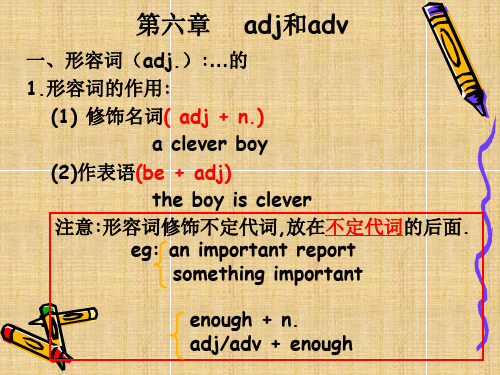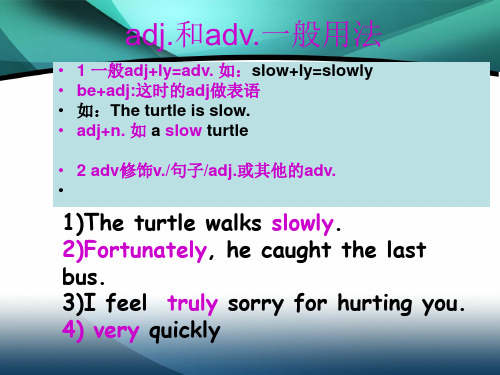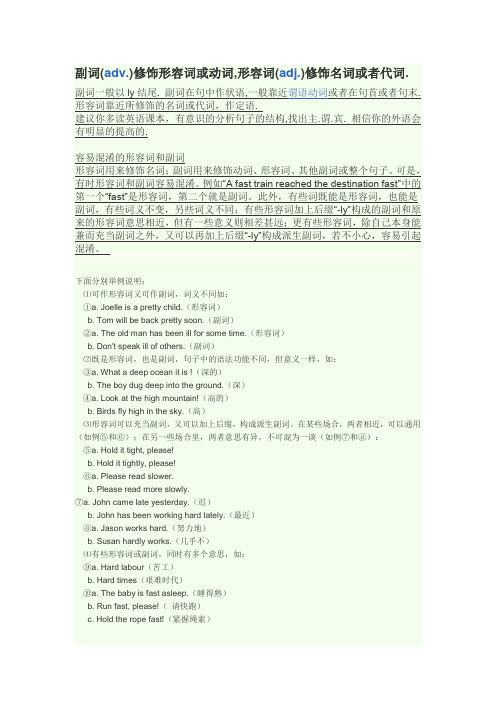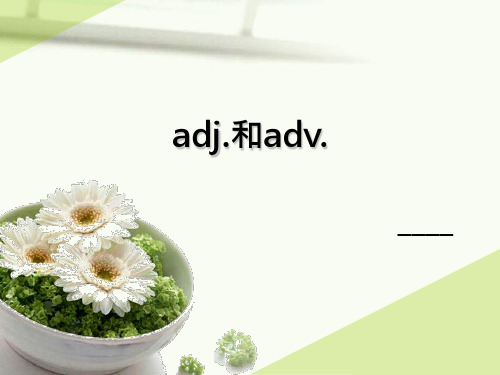adj adv的用法
- 格式:ppt
- 大小:1.02 MB
- 文档页数:34



副词(adv.)修饰形容词或动词,形容词(adj.)修饰名词或者代词.副词一般以ly结尾. 副词在句中作状语,一般靠近谓语动词或者在句首或者句末.形容词靠近所修饰的名词或代词,作定语.建议你多读英语课本,有意识的分析句子的结构,找出主.谓.宾. 相信你的外语会有明显的提高的.容易混淆的形容词和副词形容词用来修饰名词;副词用来修饰动词、形容词、其他副词或整个句子。
可是,有时形容词和副词容易混淆。
例如“A fast train reached the destination fast”中的第一个“fast”是形容词,第二个就是副词。
此外,有些词既能是形容词,也能是副词,有些词义不变,另些词义不同;有些形容词加上后缀“-ly”构成的副词和原来的形容词意思相近,但有一些意义则相差甚远;更有些形容词,除自己本身能兼而充当副词之外,又可以再加上后缀“-ly”构成派生副词,若不小心,容易引起混淆。
下面分别举例说明:⑴可作形容词又可作副词,词义不同如:①a. Joelle is a pretty child.(形容词)b. Tom will be back pretty soon.(副词)②a. The old man has been ill for some time.(形容词)b. Don't speak ill of others.(副词)⑵既是形容词,也是副词,句子中的语法功能不同,但意义一样,如:③a. What a deep ocean it is !(深的)b. The boy dug deep into the ground.(深)④a. Look at the high mountain!(高的)b. Birds fly high in the sky.(高)⑶形容词可以充当副词,又可以加上后缀,构成派生副词。
在某些场合,两者相近,可以通用(如例⑤和⑥);在另一些场合里,两者意思有异,不可混为一谈(如例⑦和⑧):⑤a. Hold it tight, please!b. Hold it tightly, please!⑥a. Please read slower.b. Please read more slowly.⑦a. John came late yesterday.(迟)b. John has been working hard lately.(最近)⑧a. Jason works hard.(努力地)b. Susan hardly works.(几乎不)⑷有些形容词或副词,同时有多个意思,如:⑨a. Hard labour(苦工)b. Hard times(艰难时代)⑩a. The baby is fast asleep.(睡得熟)b. Run fast, please!(请快跑)c. Hold the rope fast!(紧握绳索)⑸同词根的派生形容词和形容词及分词间,意思虽甚接近,但容易引起混乱,如:11a. The child is sleepy.(昏昏欲睡)b. The child is still asleep.(还在睡眠中)c. Why are you looking at the sleeping child?(睡着的)12a. Diana feels lonely/ lonesome in the big house.(感到寂寞)b. Mary was alone in the office last night.(独自)13a. Irene was awake the whole night last night.(整夜未眠)b. Tom had a wakeful night last night.(整夜未眠)c. What did you do during your waking hours last night?(醒着的时刻)(a)和(b)意思相近,但(a)的awake 只能作补足语;(b)的wakeful 则没有这个局限。


![adj[1].adv.](https://img.taocdn.com/s1/m/4007407831b765ce05081412.png)
1.good,wellwell是副词,用来修饰动词,如i swim wellgood是形容词,修饰名词,如a good student另外i am well,这里的well专门用来修饰身体健康2.big,large,greatbig是使用最广的形容词,其反义词是small。
可以指范围、面积、体积、重量等方面,口语中较常用。
如:There is a big tree in front of the house. 房子前有一棵大树。
He is big enough to ride a bike. 他长大了,足可以骑自行车了。
Mr Wang works in a big factory. 王先生在一家大工厂工作。
large侧重于面积、体积、容积和数量等,比较正式,不常用来指人。
表示物时,可与big 通用。
如:Shanghai is one of the largest cities in China. 上海是中国最大的城市之一。
They have a large farm. 他们有一座大农场。
Our school is a large one. 我们的学校是一座大学校。
great 通常侧重于形容抽象化的东西,常带有主观色彩,也可以修饰人或物,用来指人时,表示“伟大的”、“杰出的”意思。
如:Our party is a great party. 我们的党是伟大的党。
China isa great country with a long history. 中国是一个具有悠久历史的伟大国家。
3.beautiful这组词均含有“美丽”、“漂亮”、“可爱”的意思。
beautiful指能不仅给人带来感官上的快乐,而且通过感官产生思想和灵魂的愉悦,在同类词中层次最She was even more beautiful than I had remembered.她比我记忆中的她更漂亮了。
good-lookingl不如handsome, pretty意思强烈,指一般的“好看”或“悦目”。
adj adv原级的用法形容词(adj)和副词(adv)的原级是它们最基本的形态,用于比较两个或多个事物之间的差异。
以下是关于形容词和副词原级用法的详细解释:1、形容词原级:形容词原级是形容词的基本形式,用于描述名词或代词的属性或特征。
例如:The book is interesting.(这本书很有趣。
)She is beautiful.(她很漂亮。
)在比较两个或多个事物时,可以使用形容词原级进行比较。
例如:This apple is redder than that one.(这个苹果比那个更红。
)These flowers are more beautiful than those.(这些花比那些更漂亮。
)2、副词原级:副词原级是副词的基本形式,用于描述动词、形容词或其他副词的程度或方式。
例如:He runs fast.(他跑得快。
)She sings beautifully.(她唱得很美。
)在比较两个或多个动作或状态时,可以使用副词原级进行比较。
例如:He runs faster than she.(他跑得比她快。
)She sings more beautifully than him.(她唱得比他更美。
)需要注意的是,有些形容词或副词的原级形式可能与其他形式相似,容易混淆。
例如,“good”的副词是“well”,而不是“better”。
因此,在使用形容词或副词的原级时,需要特别注意它们的正确形式。
总之,形容词和副词的原级是它们的基本形式,用于描述事物或动作的状态或程度。
在使用时,需要根据具体情况选择合适的形容词或副词,并注意它们的正确形式。
形容词和副词(Adjective & Adverb )四、形容词 + ly 构成副词1. adj. + ly 构成副词: chief ----- chiefly2. 以–y 收尾 adj. 去y ---ily 构成副词: angr y (adj.) ------angr ily (adv.)3. 以–ble 收尾adj. ,去e 加 y 构成副词: comfort able (adj.) ----- comfort ably (adv.) possi ble (adj.) ------ possi bly (adv.)可能地4. 以–e 收尾adj.构成副词:去e 加 y : tru e --- tru ly / simpl e ---- simp ly直接+ly : polit e ---- polit ely (较少)5. + ly 的形容词:friendly / lovely / lonely / lively6. 形容词、副词同形:hard / fast / late / early / well / high /hard biscuit (硬的) fast food (快的) be early / late (早的/迟的) study hard (努力地) it runs fast (快地) get up early / late (早地/ 迟地) She doesn ’t look well , what ’s the matter? (adj. 健康的) She sings very well . (adv. 好地) She is a good singer. (adj. 好的) 五、adj.和adv.原级的用法1. 主语A+谓语+as+ adj./adv.原级+as……(主语A 和…一样): I am as tall as you.Mary studies as hard as John. 2. 主语A+谓语+ not as + adj. / adv. 原级+ asnot so + adj. / adv. 原级+ as B 主语A 不如Bless + adj. / adv. 原级+ thanam / is / are / was /were系V. 感官动词:look / smell / taste / sound/ feel / touch/ It seems delicious. / It seems that…✧ look angry (look angrily at sth.) ✧ 系v. + adj. (行为动词+ adv.)变得(四个):become/turn/get/grow保持(二个):keep = stay使得(一个):make 形容词作keep, stay 的宾语补足语特殊系动词find the man dead / leave the door open/closed / get everything ready / fall asleep/sick/ill / 六、adj.和adv. 的比较级和最高级的构成 (一)、在adj./adv.后+er/est 构成比较级和最高级 1、直接+ er/est :small-------smaller------- the smallest2、在以e 接尾的adj./adv.后+r/st :late -------later-------the latest3、以一个辅音字母接尾的重读闭音节词,双写该辅音+ er/est :big------- bigger-------the biggest4、以辅音字母+y 接尾的adj./adv.去掉y 变成i + er/est :busy-------busier-------the busiest (二)、more/the most+在adj./adv. 原形前构成比较级和最高级1、 more/the most+多音节形容词前:important more important the most important2、 -ful,-ous,-less,-tive,-able,-ed,-ing 等构成的双音节形容词,加 more, the most :famous more famous the most famous;3、-ly 的副词,加 more, the most :widely-----more widely-----the most widely bright --- brighter --- brightest clever --- cleverest --- cleverest more / the most stupid (三)、不规则变化good --- better --- the best bad --- worse --- the worst many --- more --- the most well --- better ---the best ill --- worse --- the worst much --- more --- the most little --- less --- the least far ---- farther ----- farthest / far ---- further ----- furthest七、adj.和adv.比较级和最高级的用法 (一)、比较级1. 主语+谓语+ adj., adv.比较级+than +对比成分:He is taller of the two. / He runs faster than me.of the two 用比较级:The ball is bigger of the three. (big)much, far, still, even, a little, a bit, a lot 等状语词修饰比较级:Sue studies even harder than May.2. 主语+谓语+比较级+than that /those …:The weather in Hongkong is cooler than that in Shanghai.The vegetables in the street markets are better than those in the shops.3. 主语+谓语+比较级+and+ 比较级+… (越来越…)Autumn is coming. It is getting cooler and cooler.4. the+比较级……, the +比较级……(越…就越…)The earlier you start, the sooner you will be back.5. like……better than…… = prefer…to(喜欢…更甚于…)She likes oranges better than apples. = She prefers oranges to apples. (二)、最高级1. one of + 名词(复数) + 形容词(最高级):Shanghai is one of the biggest cities in the world.2. 最高级+of/in/among+比较范围:Shanghai is the biggest city in China.3. 最高级=比较级+than any other+名词(单数)Tom is the tallest student in class. = Tom is taller than any other student in his class.= Tom is taller than other students in his class.4. the +序数词+最高级:The Century Park was the second largest in Shanghai.。
(一)知识讲解<一> 形容词的构成:1. 本身即为形容词的词(如:red, glad, nice, beautiful等)2. 由“名词+y”构成如:sun→sunny wind→windy fun→funny cloud→cloudynoise→noisy luck→lucky等3. 形容词具有独特的后缀形式主要有:-able, -ible, -al, -ical, -ant, -ary, -ful, -less, -ous等。
如:comfort able, terr ible, nation al, natur al, polit ical, chem ical, import ant, plea sant, ordin ary, necess ary, beauti ful, wonder ful, care ful, hope less, care less, fam ous, danger ous等。
4. 以-ly结尾的形容词如:friendly友好的;lonely孤独的;lovely可爱的;等<二> 形容词的用法及位置1. 作定语形容词修饰名词时置于名词之前;修饰不定代词时,置于不定代词之后。
如:What beautiful flowers!I have something important to tell you.【考题链接】①What a (sun) day it is today! Let’s go to the park.答案:sunny解题思路:这是一个感叹句,day为单数可数名词,其前用形容词来修饰。
句意为“多么晴朗的一天啊!咱们去公园吧。
”②In the West, people like to finish a meal with , for instance, dessert.A. sweet anythingB. sweet somethingC. anything sweetD. something sweet答案:D解题思路:形容词在修饰不定代词时,应置于不定代词后。